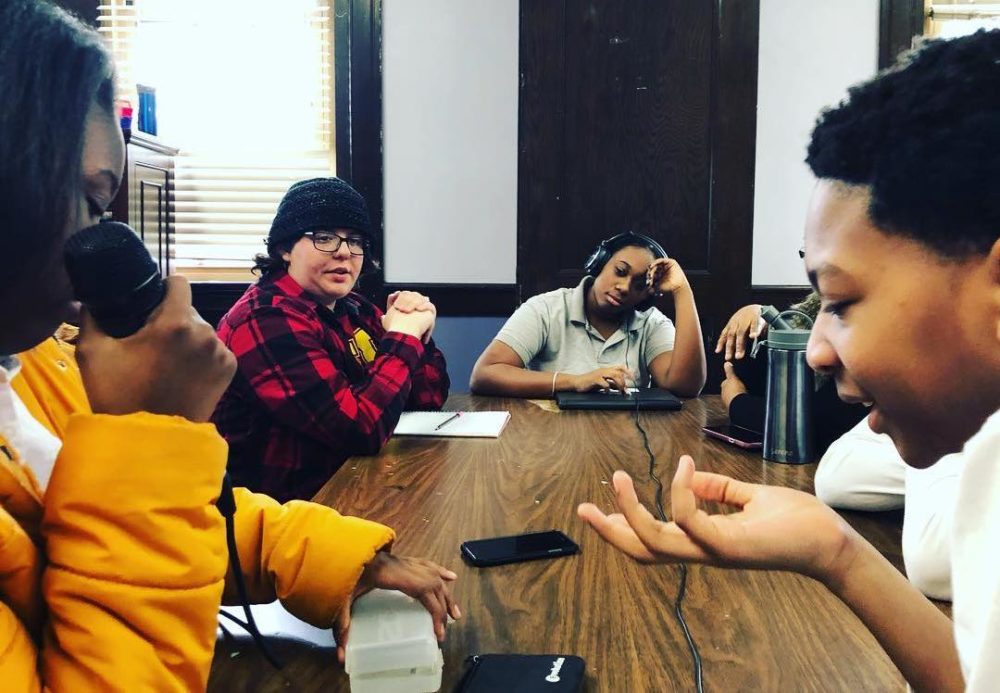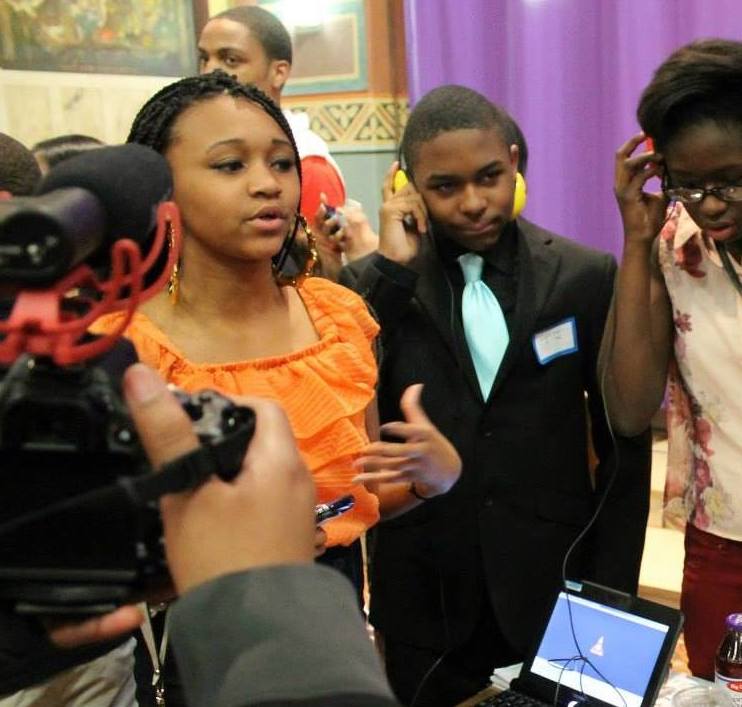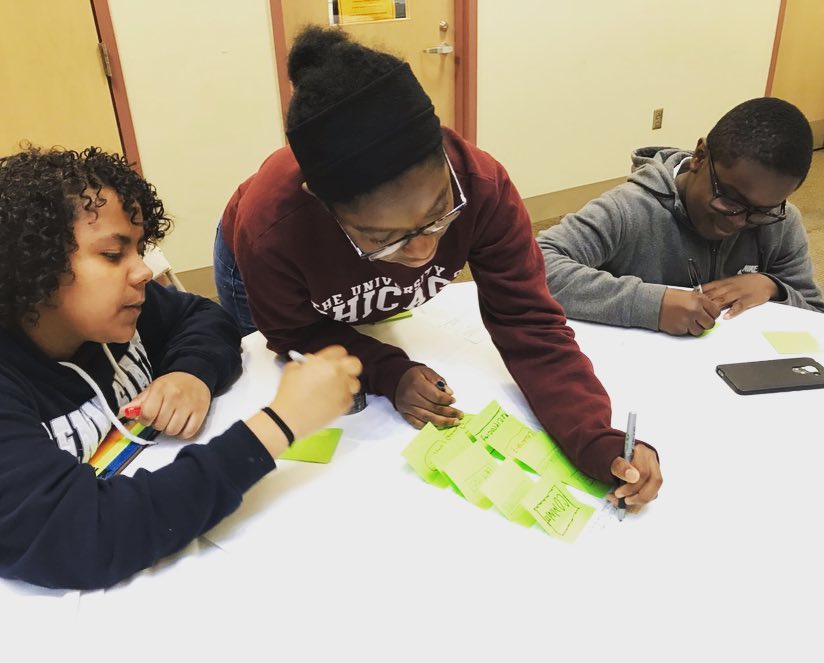
Kidsburgh Learning Guide: Helping young people use their voices
Photo above, courtesy of Carlow University: Local students working with the Youth Media Advocacy Project.
Greta Thunberg was just 15 when she began speaking publicly on environmental issues. Three years later, she has nearly 5 million Twitter followers. Malala Yousafzay was 17 when she was awarded the Nobel Peace Prize for her activism, and she has become one of the world’s most powerful speakers on human rights for women and girls.
From high school students speaking out against gun violence to the many teens organizing demonstrations against social injustice, youth voices are being heard like never before.
Youth voices are also emerging in subtler ways: Some school districts and communities are beginning to involve students in planning and decision-making. And many organizations have begun teaching leadership and communication skills to teens and even tweens.
If your child is passionate about social issues or is beginning to discover that they’d like to have a voice in their community, there are many ways you can support that goal right here in Pittsburgh.

WHERE TO BEGIN
A great first step is learning what youth voice is all about.
The Center for Youth Media Advocacy (CYMA) at Carlow University partnered with Remake Learning to build a Youth Voice Best Practices toolkit that highlights the ways adults can understand and elevate youth voice. This resource was designed for educators and people who run youth programs but it can also be valuable for parents, says Jess Gold, formerly a program coordinator for the CYMA and a creator of the toolkit.
“A lot of the tools and ideas are really relevant for healthy relationships in families and engaging with young people in your family in a way that builds trust and strengthens a young person’s sense of agency,” Gold says.
The toolkit can also help you find local programs that support youth voice.
Many programs for tweens and teens — even those focused on things like art or technology, rather than on advocacy and social change — are now building in space for teen decision-making and leadership. If your child is already involved in a summer camp, a club or an afterschool group, you can ask the organizers what role youth voice might play in that experience.
Another great place to start: Talk with your child about what kinds of progress and change they’d like to see in their community. Then brainstorm together about how they might get their voice heard about those issues. Let them know that children’s voices are needed to help make the world a better place.
WHAT YOU CAN DO TODAY
Virtually and in-person around the Pittsburgh region, there are many ways to encourage your child to develop and use their voice.
DIGITAL DISCOURSE
The team at Saturday Light Brigade (SLB), which helped create the Youth Voice toolkit, has been teaching young people to use their voices for decades.

“We have programs for teens at SLB, where you can record commentaries for broadcast, you can make podcasts and create documentaries,” says Larry Berger, executive director of SLB Radio Productions. “And it’s at no cost. Some of the programs might even come with a stipend, where youth will receive an honorarium for the work that they do.” (Berger says parents seeking details about SLB’s Youth Express program can visit that link or reach out to Tad Wissel at tad@slbradio.org.)
Some SLB students go on to work in the media, but most participate just to learn to tell stories about issues they care about.
“We don’t purport to be creating the next radio broadcasters or sound engineers or media specialists,” Berger says. “We’re more interested in creating people who feel confident about expressing themselves and comfortable being their authentic selves.”
During SLB workshops, students are “getting exposed to ideas of other people, learning how to get their ideas across to others and learning things like deadline skills and working together.”
However a student might decide to use their voice, Berger says the key is that someone is listening: “If you get a sense that your voice matters, then you get a sense that you matter. That’s really what this is all about.”
Through Carlow’s Youth Media Advocacy Project, Gold has helped high school students collaborate with SLB on a series of documentaries on issues including COVID-19 and racism.
Another great resource is the YMCA Lighthouse Project, where students can get their voices heard by mastering skills like video production, songwriting, deejaying and podcasting.
Students can also gain media skills and learn about youth advocacy by getting involved with 1Hood Media. Past workshops have included Youth Organizing Through Hip Hop and Art, Activism, Technology and the Evolution of Social Justice Movements.
Another youth voice organization that has grown out of 1Hood Media is Young Black Motivated Kings and Queens.
EMBRACING CIVIC ACTION
Young Pittsburghers have many opportunities to learn how the local and federal government works and how to get involved. GirlGov gives girls “a chance to both understand how to and experience using their voice to create legislative and policy change,” says Beth Sondel, director of education at Pittsburgh’s Women & Girls Foundation, where she runs the GirlGov program.
Through GirlGov’s Summer Leadership Academy, students can spend three weeks of their summer learning how to make a difference in their community while networking with other students and adults. The goal? To begin learning how our systems work in America, so that teens can translate their passion for justice and equity into tangible, systemic change.
GirlGov tells us the program is designed for “young women and femmes who are entering 9th through 12th grade.”
Another organization that empowers teens to make a difference is Teen Bloc Youth Organizing Academy, run by A-Plus Schools Pittsburgh. Teen Bloc is a collective of 8th-12th grade students in the city of Pittsburgh who want to learn to advocate and empower themselves to ignite change and amplify overlooked voices.
If a full-on program isn’t right for your child at the moment, consider finding a youth voice-focused way to spend a Saturday. One great option: Check out the America 101 programming at Heinz History Center. Along with visiting the History Center in person, you can take a deep dive into civics through the Citizen You app and the America 101 app, both available for free.
And although it’s quite expensive, Pittsburgh families can also look into Luminari’s I Want to Be an Ambassador program.
MAKING THEIR MESSAGE
Although kids spend a lot of time in the digital world, they can also get their voices heard IRL by screen printing posters, t-shirts and buttons emblazoned with their message.
At Artists Image Resource (AIR), a printmaking studio on the North Side, has traditionally devoted Wednesday nights to teen projects. “If you show up with a graphic, you can screen print it on t-shirts yourself and learn to do other things,” says artist and art educator Cheryl Capezzuti. “There’s someone there to help you.”
AIR is currently making changes to their youth programming, so parents or teens can check out their website and reach out to info@artistsimageresource.org with any questions.
The museumlab also teaches screenprinting, as does the Warhol Museum.
GETTING INVOLVED
Throughout the Pittsburgh region there are organizations that need help from youth volunteers. Kids and families can choose a community issue they care about and then search for local organizations tackling this topic.
Just one example: Kids can get involved with battling food insecurity through the Food Rescue Hero app, which connects them with 412 Food Rescue. As they begin learning more and having personal experiences dealing with the local issue they care about, you can help them isolate what they want to see changed and how they want to talk about it.
Another nonprofit that welcomes teen and tween volunteers accompanied by parents: Beverly’s Birthdays. This nonprofit hosts birthday parties for children who are experiencing homelessness or living in poverty. Some of the children have never had a birthday party before. Volunteers help host the parties at locations around the Pittsburgh region.
These experiences are likely to get kids thinking about the change they’d like to see in the world. By stepping in to help, they will discover just how much impact each of us can make if we choose to be a force for change.
Got younger kids? Check out VolunTOTs, which launched earlier this year and welcomes volunteers of all ages.
Another great place to join (or start!) a community group is at school. A growing number of districts in the Pittsburgh region have SHOUT groups and Global Minds Initiative groups. And the Pittsburgh-born #bethekindkid movement can now be found in school districts throughout the region.
“Young people have always wanted to have a voice. I think that it’s adults that are more recently realizing that they need to listen to young people,” says GirlGov’s Sondel.
“Programs that may be working with teams that have not been particularly youth voice-oriented that tend to involve adults making a lot of decisions for youth are starting to shift in their structure and really creating space for team decision making and youth-led programming,” Gold says. Organizations “are intentionally building in structures that elevate youth voices and empower youth to make decisions. … I’ve been excited to see that happening more and more.”
LEADERSHIP AT HOME
As tweens and teens get older, parents can look for safe ways to give their children more decision-making power. After handling everything for our kids when they’re young, it can seem strange to step back and ask, ‘Which areas of daily life could we let this child manage on their own, even if we know they may not always make the best decisions?’
This work of encouraging youth voice and youth leadership can feel challenging sometimes — for teachers and for parents. But it’s incredibly valuable.
“There are a lot of folks in education who still have that rigid notion of what education and youth work looks like. It’s, ‘I’m the adult. I’m the leader. I have the knowledge and I impart that knowledge to you, the young person who should listen and only speak when spoken to, and learn from me,” Gold says.
Letting go of that approach “can be really hard for adults because we’re also kind of indoctrinated into these ways of teaching and learning,” she says. “It can be really scary to let go of that power.”
The benefits, though, make it worthwhile: When we share power with young people and trust them to use their voices, they can rise to the occasion and become the next generation of leaders that our ever-evolving world needs.
QUICK LIST OF LINKS
Heinz History Center: America 101
Luminari’s I Want to Be an Ambassador
SHOUT (handprintshealfootprints.org)
Teen Bloc Youth Organizing Academy
Young Black Motivated Kings and Queens
Youth Media Advocacy Project run by Carlow University
Youth Voice Best Practices toolkit
Places young people can volunteer:
Food Rescue Hero app from 412 Food Rescue
You can also check out our additional Learning Guides about visual arts, maker learning, science, technology and outdoor learning.